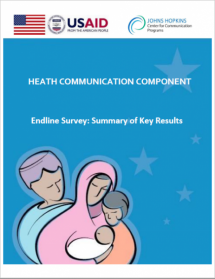Health Communication Component Endline Survey
The HCC Pakistan endline survey aimed to evaluate the extent to which the HCC program achieved its program objectives among the target population. Primary aims of the study were to estimate the effect of the HCC interventions on behavioral outcomes of interest, and compare outcomes among individuals exposed to the HCC messages and interventions with individuals who were not exposed to the HCC program.
The survey showed that higher proportions of women in the program districts were currently using contraceptives and especially modern methods of contraception. The participating women preferred, and commonly used, types of contraception designed for females rather than methods designed for the male. Discussions about FP with spouse, especially about birth spacing and limiting the number of children, also increased among participants in the HCC program area, and some women had initiated discussions on FP with their spouse. The HCC survey showed that high proportions of women participating in the study had positive intentions to wait at least three years between their last and next birth, to have a facility-based birth and a skilled birth attendant in attendance during delivery of their next child.
There was moderate exposure to the HCC Bright Star campaign and project-developed FP messages within the program target area. In addition, participant exposure to the HCC Bright Star program campaign and FP messages was associated with higher estimates for engaging in several desired key behavioral outcomes including approval of FP and birth spacing, approval of and use of modern contraception, engagement in spousal communication on FP, participantinitiated discussions on RH and MH-related issues, and intentions to use maternal care services in the future.
The HCC Pakistan project demonstrated that communication-focused individual- and community-level interventions have potential for promoting improved RMNCH outcomes through individual behavior change.
Source: Health Communication Component
Date of Publication: March 25, 2019
SIMILIAR RESOURCES
Tools
Examples
- Entertainment-Education Curriculum
- Noora Health COVID-19 Resources
- Training Toolkit on MSM Programming for the MENA Region
- FGM Infographics
- Early Impacts of the COVID-19 Pandemic: Findings from the 2020 Guttmacher Survey of Reproductive Health Experiences
- Social Franchising: Improving Quality and Expanding Contraceptive Choice in the Private Sector
- Who Self-Cares Wins
- Health Communication Component Infographic Report
- Health Communication Component, Pakistan - Project Documentaries
- Health Communication Component, Pakistan - Project TV Ads
- Health Communication Component, Pakistan - Music Videos and Jingles
- Health Communication Component, Pakistan - Soap Operas and Films

